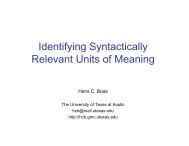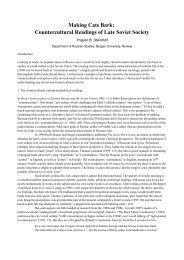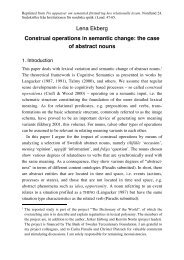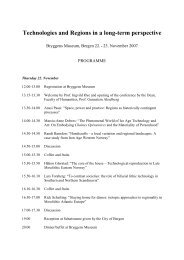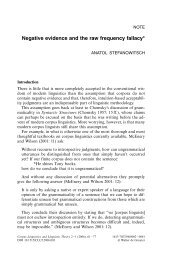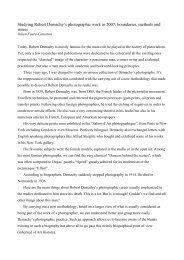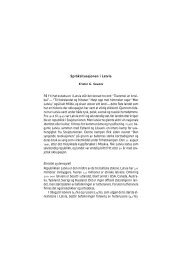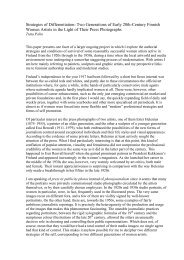Jostein Børtnes Dostoevsky's Idiot or the Poetics of Emptiness1 ...
Jostein Børtnes Dostoevsky's Idiot or the Poetics of Emptiness1 ...
Jostein Børtnes Dostoevsky's Idiot or the Poetics of Emptiness1 ...
Create successful ePaper yourself
Turn your PDF publications into a flip-book with our unique Google optimized e-Paper software.
<strong>of</strong> <strong>the</strong> novel can hardly be exaggerated» (Onasch 1976:132). And at exactly <strong>the</strong> time<br />
when he was writing The <strong>Idiot</strong>, Dostoevskya was expl<strong>or</strong>ing what Onasch calls <strong>the</strong><br />
«poetische Nutzbarmachung» - <strong>the</strong> poetic usability - <strong>of</strong> this hagiographic genre in<br />
connection with three o<strong>the</strong>r projects: <strong>the</strong> novel referred to as The Emper<strong>or</strong>, <strong>the</strong><br />
unfinished St<strong>or</strong>y <strong>of</strong> Captain Kartuzov, and <strong>the</strong> sketch called The Holy Fool. (Er hat<br />
sich gerade während der Beschäftigung mit dem Roman «Der <strong>Idiot</strong>" sehr intensiv mit<br />
der poetischen Nutzbarmachung dieser hagiographischen Gattung befasst» (Onasch<br />
1976:133).<br />
Even in <strong>the</strong> opening chapter <strong>of</strong> The <strong>Idiot</strong> Rogozhin concludes that Prince<br />
Myshkin is a «юродивый», <strong>the</strong> reason being that <strong>the</strong> prince, acc<strong>or</strong>ding to his own<br />
w<strong>or</strong>ds, has no experience <strong>of</strong> women:<br />
— А до женского пола вы, князь, охотник большой? Сказзывайте<br />
раньше!<br />
— Я, н—н—нет! Я ведь... Вы, может быть, не знаете, я ведь по<br />
прирожденной болезни моей даже совсем женщин не знаю.<br />
— Но коли так, — воскликнул Рогожин, — совсем ты, князь, выходишь<br />
юродивый, и таких, как ты, Бог лювит! (Dostoevsky 1973:14)<br />
The fact that <strong>the</strong> prince is sexually inexperienced because <strong>of</strong> his inb<strong>or</strong>n handicap is<br />
hardly sufficient to make him a «юродивый» in <strong>the</strong> hagiographic meaning <strong>of</strong> <strong>the</strong><br />
w<strong>or</strong>d. In <strong>or</strong>thodox hagiography, a «юродивый» is <strong>the</strong> Russian equivalent <strong>of</strong> Greek<br />
«salos»:<br />
a person who serves God under <strong>the</strong> guise <strong>of</strong> foolishness. In principle, <strong>the</strong><br />
disguise is not discovered until <strong>the</strong> fool is dead. Then he <strong>or</strong> she becomes a<br />
saint. If <strong>the</strong> holy fool happens to be recognised earlier, he runs away, <strong>or</strong> else<br />
commits an act that is so foolish that <strong>the</strong> rent in his disguise is repaired"<br />
(Rydén 1981:106).<br />
6





